UK MP Urgently Demands Designation Of Iran's Revolutionary Guard
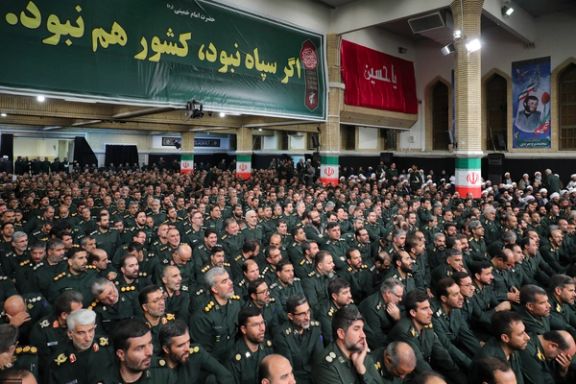
A prominent British politician has called for further pressure upon his government to designate Iran's Islamic Revolutionary Guard Corps as a terrorist organization.

A prominent British politician has called for further pressure upon his government to designate Iran's Islamic Revolutionary Guard Corps as a terrorist organization.
David Jones, a former British minister, voiced his concerns in an op-ed published in The Telegraph, emphasizing the need to go beyond current sanctions and formally recognize the IRGC's status as a threat to national security.
For several years, Jones, along with other British parliamentarians, has advocated for the IRGC to be proscribed as a foreign terrorist organization. Recent developments suggest that the UK's Home Secretary Suella Braverman is taking these concerns seriously, with reports indicating heightened Iranian agent activities inside the UK. These activities are believed to involve collaboration with criminal networks targeting political opponents, making the IRGC a top-tier threat to the UK's national security.
In recent years, the IRGC's role in suppressing dissent among the Iranian population has become increasingly evident. The November 2019 nationwide anti-regime uprising saw the IRGC ruthlessly quelling protests, resulting in the deaths of 1,500 protesters in five days.
Over the past year, the IRGC's brutal tactics have led to the deaths of hundreds of regime opponents, mostly at the hands of the IRGC itself, during Iran's latest uprising that began in September. These fatalities have been accompanied by roughly 30,000 arrests.
In a parliamentary session in June, members of the British Parliament expressed their concerns over the IRGC's terrorist activities and global threats, including those within the UK, calling for its formal designation as a terrorist organization.
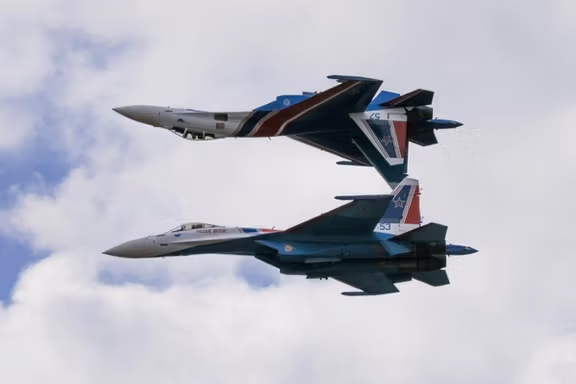
Iran's pursuit of advanced warplanes from its ally Russia to modernize its aging fleet has faced numerous hurdles, plunging the regime into a state of uncertainty.
While Iran recently took delivery of a batch of Russian-made Yakovlev Yak-130 pilot training aircraft, these light jet trainers fall far short of the twin-engine, supermaneuverable air superiority Russian fighters, like the Sukhoi Su-35, which Iran had been seeking for years.
For a considerable time, Iran had been making announcements about the "imminent" delivery of Su-35 fighter jets. However, the hopes of acquiring these advanced aircraft were dashed when Iran's Defense Minister confirmed in July that the deal had collapsed. Moreover, Iran's claims of domestic production capabilities for such fighters have yet to materialize. While Iran has supplied Russia with kamikaze drones for its war on Ukraine, these efforts have led to several rounds of sanctions against the Iranian regime.
Paradoxically, Moscow has been unwilling to sell modern fighter jets or advanced aerial warfare systems to Iran. This reluctance stems from a range of concerns, including geopolitical considerations and regional stability.
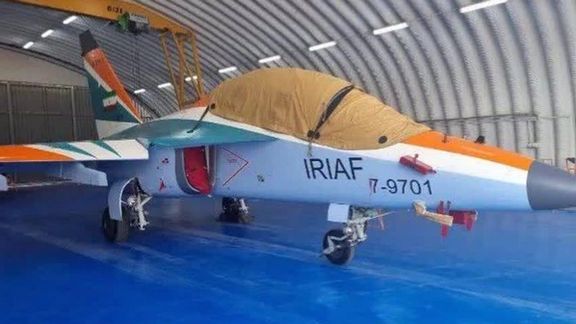
One primary factor contributing to Russia's hesitancy to supply Iran with high-tech fighter jets is the absence of bargaining leverage on Iran's part. Iran's economic challenges, compounded by international sanctions, have limited its ability to secure favorable terms for such purchases. On a similar note, China has refrained from providing Iran with high-tech fighter jets, as Beijing is wary of potential US retaliation. What's more, China is known to be cautious about jeopardizing its own programs, as it seeks to profit from weapons deals. For example, Iran prefers to pay in oil and natural gas, rather than dollars or euros, in its dealings with China.
According to Zhou Chenming, a Beijing-based defense analyst, China has already accumulated significant energy reserves and is primarily focused on making money through arms deals. Consequently, China has been reluctant to engage in potential deals involving its Chengdu J-10C fighter jets with Tehran. Even attempts by the United States to sell advanced F-16 fighter jets to Taiwan, which concerned China greatly, did not persuade Beijing to offer its Chengdu J-10 fighter jets to Iran in retaliation.
The political climate between Iran and its two major allies, Russia and China, while often collaborative on other fronts, has not yielded significant advancements in Iran's deteriorating aerial arsenal. A significant factor contributing to Russia and China's caution is the delicate balance of their relations with Arab countries in the Middle East. Many Arab nations have expressed their unease and opposition to Iran acquiring fighter jets, fearing that it could shift the balance of power in the region. This apprehension has encouraged Russia and China to tread cautiously, as they do not wish to strain their relationships with key Arab trading partners.
Considering these challenges, the arrival of two Yak-130 light training aircraft in Iran has been portrayed by the regime's media as evidence that Russia would eventually start supplying its modern warplanes to Iran. Some analysts have speculated that the war in Ukraine has disrupted the delivery of Su-35s, leading to delays.
Defense Minister Ashtiani, in an article published in the government's Arabic-language daily al-Vefagh newspaper, claimed that all arms embargoes imposed on Iran are set to expire soon, expressing eagerness to expand military ties. European Union ballistic missile sanctions are scheduled to expire on October 18 under the UN resolution endorsing the 2015 nuclear deal. However, European diplomats are considering retaining these sanctions.
Analysts like Sasan Karimi have suggested that concerns by the US and Europe about Iran's plans to acquire high-tech fighter jets may have eased due to recent reports of behind-the-scenes negotiations between Tehran and Washington. While the exact timing of any Su-35 delivery remains uncertain, some believe that it is more logical for this to occur after the expiration of sanctions in October.
The aging nature of Iran's military aircraft is no secret. Some of Iran's fighter jets, like the F-4 and F-5, are well over half a century old, while the more advanced F-14 was procured before the Islamic revolution of 1979. Given Iran's pressing need to modernize its military fleet, China and Russia currently remain Iran's only options for procurement. This is because other fighter-producing countries, such as the United States, Europe, Sweden, and France, are unlikely to supply any weapons. Additionally, the production of fighter jets in Japan and South Korea is closely tied to joint programs with the United States.
Even if Russia and China were to consider supplying Iran with newer fighter jets, it is highly likely that the numbers would be limited to avoid posing a substantial threat to Tehran’s regional rivals. According to different sources, Russia itself has about 110 to 150 Sukhoi Su-35s.
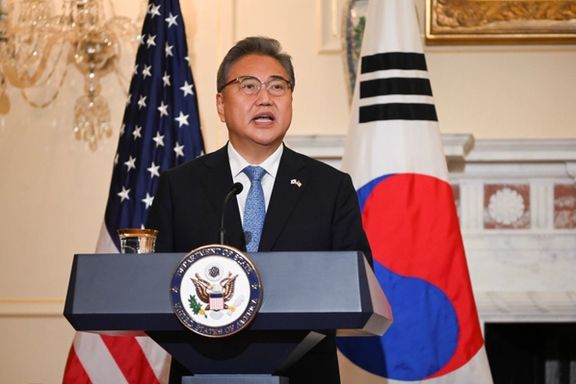
South Korea has announced it is actively coordinating with relevant nations in their ongoing endeavors to unfreeze Iranian funds held within its banking institutions.
In a statement released on Tuesday, South Korea's Foreign Minister Park Jin confirmed that he spoke to Hossein Amir-Abdollahian, his Iranian counterpart, and that he is working to resolve this matter.
This comes following a recent diplomatic agreement between Tehran and Washington, in which Iran agreed to release five imprisoned American citizens in exchange for the release of $6billion frozen Iranian assets in South Korea.
According to reports from South Korean media, these funds, earned from oil sales before the US reimposed sanctions on Iran in 2018, have been transferred to the Swiss Central Bank, after which they will be converted into euros and then transferred to an account in Qatar that Iran can access.
American news source CNN, reported in August that the transfer of funds from South Korea to Qatar is likely to take 30 to 45 days.
The official news agency of the Islamic Republic has also confirmed the continuous efforts to transfer Iran's frozen assets from South Korean banks. According to IRNA, Amir-Abdollahian expressed optimism, stating that this development could “mark the commencement of a new phase in bilateral relations, and he welcomes any initiatives that contribute to enhancing ties between the two nations.”
Presently, the five American citizens are under house arrest in Iran. However, specific details regarding the Iranian prisoners to be exchanged with the five individuals as part of the recent agreement have not been publicly disclosed.
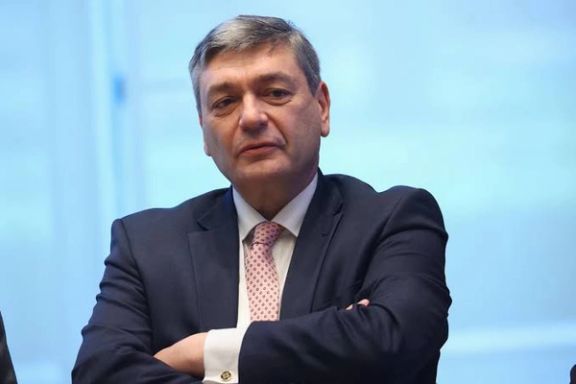
Russia and Iran are actively negotiating a new treaty to strengthen and expand their bilateral cooperation, according to Russia's Deputy Foreign Minister Andrey Rudenko.
Deputy Minister Rudenko made this announcement during a session hosted by the Valdai Discussion Club, highlighting the increasing positive momentum in Russia-Iran relations in recent years.
"We are working on a new major treaty with Iran, which will encompass, among other things, our key areas [of cooperation]," stated Deputy Foreign Minister Rudenko.
The development of this new treaty underscores the commitment of both nations to strengthening their partnership and fostering closer ties. Over the past few years, Russia-Iran relations have steadily progressed, promising further advancements in their collaboration.
During the Iranian President's visit to Moscow in January 2022, he presented a draft of a 20-year cooperation agreement, which would update the previous 2001 version. However, Moscow has yet to sign this proposed agreement.
While Iranian officials had previously suggested that preparations for the agreement were finalized and anticipated a swift signing when the two presidents met, recent reports indicate that additional preparations are deemed necessary.
One factor affecting the pace of these negotiations is the impact of international sanctions on Iran's oil industry. Notably, major Chinese and Russian companies, recognized for their global presence, have been cautious about engaging in business with Iran due to these prevailing sanctions.
Despite Iran's existing 25-year contract with China, signed on March 27, 2021, and ongoing negotiations for a 20-year economic trade deal with Russia, there has been public discontent in Iran regarding these agreements. Concerns have been voiced by many Iranians who fear that such pacts may potentially compromise the nation's interests.
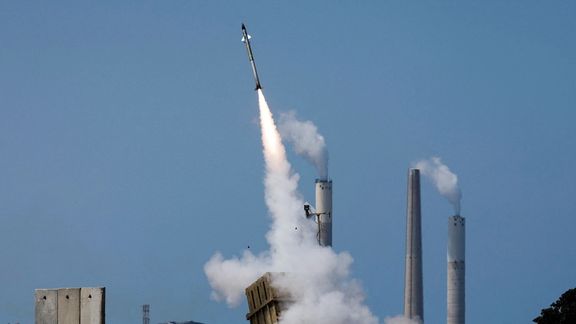
A former counter-terrorism advisor to two Israeli prime ministers triggered an intense debate about whether Iranian proxies will attack Israel in September or October.
There is, however, disagreement within Israel’s security and defense establishment over a planned Iran-backed attack against the Jewish state.
Yigal Carmon, the founder of the Middle East Media Research Institute (MEMRI) and one of Israel’s leading counter-terrorism experts, wrote an August 31st article titled “Signs Of Possible War In September-October,“ in which he argued a “confrontation could result from an uncontrolled deterioration on the ground or from the use of new and unusually deadly weapons by these movements [Hamas and Hezbollah].”
Carmon said, “neither Hamas nor Hezbollah are eager to start a comprehensive confrontation with Israel” but noted that growing acts of jingoism and saber-rattling by both Iranian regime-backed jihadi movements (including Palestinian Islamic Jihad) on Israel’s borders.
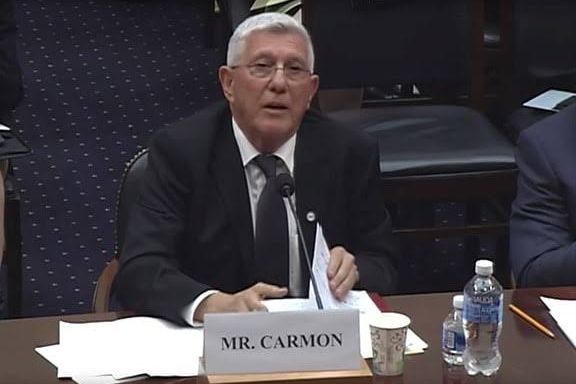
Hezbollah has set up tents in the Har Dov area within Israeli territory and was involved in “dismantling surveillance cameras along the border fence near Fatima Gate, and firing an anti-tank missile into Israel,” wrote Carmon.
Carmon, who is a fluent Arabic speaker, added “Hezbollah, which does not recognize the Blue Line as the international border between Lebanon and Israel, has recently made a new territorial claim, demanding that Israel give Lebanon sovereignty over the northern Rosh Hanikra railway tunnel, likewise in Israeli territory. At the same time, it also demands to curtail UNIFIL's freedom of action in South Lebanon.”
The US government and many European states have classified Iran’s strategic partner, Hezbollah, a foreign terrorist organization. Both the US and EU have designated Hamas and the PIJ terrorist entities.
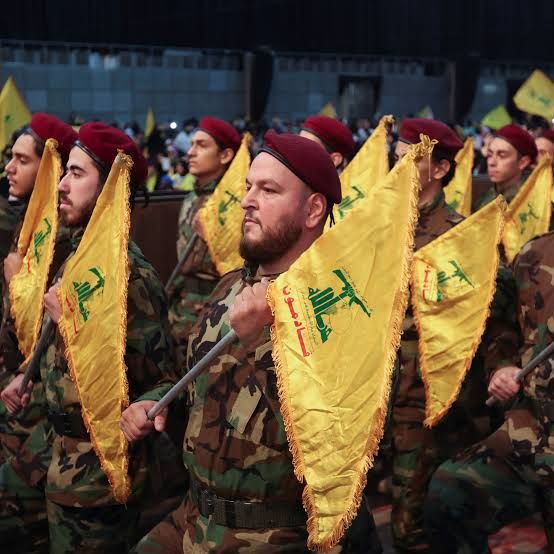
Carmon wrote, “There has also been an increase in efforts by Iran and Hezbollah to smuggle weapons into the West Bank, similar to the smuggling of weapons into Gaza. PIJ secretary-general Ziad Al-Nakhaleh said that, during his June 2023 meeting with Iranian Leader Ali Khamenei, the latter had ‘reiterated [the need to] develop the arming of the West Bank and the resistance there.’ Nakhaleh added: ‘We, as Palestinians and as resistance forces and movements, understand the importance of arming the West Bank, but this requires efforts by the Palestinians themselves, and also the assistance of our brothers in the Islamic Republic of Iran.’”
The spike in recent activity between Iran’s foreign minister Hossein Amir-Abdollahian and Tehran’s PIJ, Hamas and Lebanese allies in Beirut was also a subject of Carmon’s analysis.

Abdollahian stressed that in the Beirut meeting the statements of Khamenei about the need "to help the West Bank" and about Iran's "ongoing [commitment to] assisting the resistance with all its might." Amir-Abdollahian added, "the establishment of the joint Hamas-PIJ [war] room reflected a smart move on the part of the resistance.”
Carmon noted that Amir-Abdollahian also met with Hezbollah Secretary-General Nasrallah, who then met with Al-'Arouri and Al-Nakhaleh to "make a joint assessment of the situation in the West Bank, the escalation of the resistance activity and the latest Israeli threats."
Abdollahian and Iran’s allies underscored at the meeting "the steadfastness and steadiness of all the forces of the resistance axis in the struggle against the Zionist enemy," and cooperation between the "resistance movements" in Palestine and Lebanon.
When asked about Carmon’s analysis, Brigadier-General (res) Amir Avivi told Iran International, "While the specter of war unfortunately always looms along and beyond our borders, whether fueled by Iranian money and weapons or online incitement, at this time I do not share the assessment of an imminent war in September or October.
The terrorist organization Hezbollah in Lebanon has indeed been conducting provocations along the border, and the other Iranian proxies have made belligerent statements.”
Avivi, the founder and CEO of the Israel Defense and Security Forum (IDSF), added, “And yes, religious holidays are historically periods of inter-community tensions, but at this time I believe that neither Hezbollah nor Hamas have an appetite for a full-blown confrontation with Israel, because they understand how devastating it would be for them.”
Carmon had also warned in his article that “During the Jewish holidays in September and October, Jews are likely to visit the Al-Aqsa compound, as happens every year. Hamas and Hezbollah spokesmen have stressed that this could lead to a regional war.”
Avivi noted that “Both Hamas and Hezbollah are suffering from internal unrest and lack of legitimacy in their respective fiefdoms, and it would be wise of them to refrain from jeopardizing their own future. Contrary to media reports and wishful thinking amongst Iranian proxies, the IDF is fully fit for combat, alert and ready to respond to any aggression."
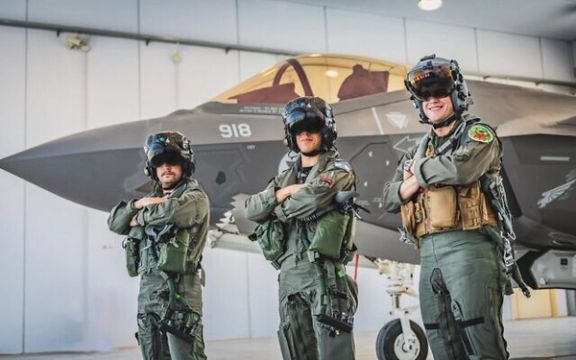
When presented with these arguments, Carmon told Iran International that “I said they [Hamas, Hezbollah and Palestinian Islamic Jihad] do not want it[war] but things can get out of control.”
Carmon raised the example of Nasrallah who said after the 2006 Second War in Lebanon about the kidnapping of Israeli soldiers that sparked the war: “We did not think, even one percent, that the capture would lead to a war at this time and of this magnitude. You ask me, if I had known on July 11 ... that the operation would lead to such a war, would I do it? I say no, absolutely not.”
A second factor that is part and parcel of Carmon’s “uncontrolled deterioration” framework during the lead up to the full-blown war in 2006 was the entry of an Israeli Merkava 2 tank into Lebanon that passed over a massive explosive device, destroying the tank and killing its four crew members.
Carmon said “People do things without knowing repercussions. This is what happens when people like Avivi listen only to themselves and not to the other side.” Carmon also warned about the shipments of advanced new weapons, including Kornet anti-tank missiles, to Iran-backed terrorist terrorists, that can be used by against Israelis.

A court in Germany has levied accusations against an individual in connection with a fire that occurred in November 2022 at a school in the city of Bochum.
The defendant is alleged to have received directives from the Iranian government, with the primary target being a synagogue situated adjacent to the school.
The 36-year-old defendant, a dual Iranian-German citizen, is set to face trial on September 12th in the regional high court of Dusseldorf, as indicated by the official indictment. He has been charged with orchestrating an arson attack under the orders of Iranian government authorities, targeting a synagogue in the Ruhr region of western Germany.
Court documents reveal that the accused made unsuccessful attempts to recruit an acquaintance as an accomplice in executing the attack plan, with the acquaintance subsequently reporting the matter to law enforcement authorities.
The incident, which happened in mid-November, resulted in only minor damage. Since that time, the accused has remained in custody.
Prior to these developments, German media had referred to the accused as Babak J. and linked him to an earlier synagogue attack in the city of Essen, in November. Reports indicated that he had also been planning a third attack on a synagogue in Dortmund, where he was eventually apprehended.






